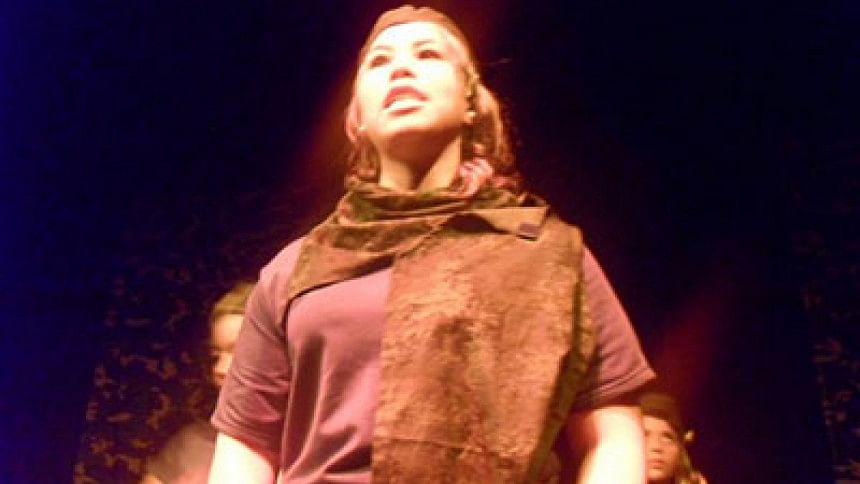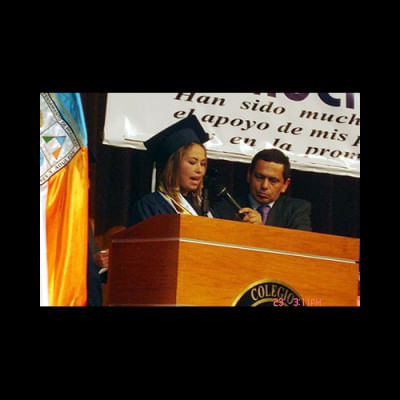From revolution to reconciliation

Originally from El Bordo, Department of Cauca, Colombia, María Alejandra Martínez, is the daughter of fighters for the Revolutionary Armed Forces of Colombia (FARC-EP). After they died during military operations, she was trained for guerrilla warfare. She was “recaptured” at the age of 16 and today, at 26, she writes, performs and participates in an artistic-political project that brings together displaced/demobilised survivors, police and military to build peace, reconciliation and reconstruction. In New York to speak at the UN Women-hosted launch of a book by another former child soldier on 15 June, she shares her story, in her own words...
“I’ve lived among weapons since I was born. In December 1994, my mother and other relatives were killed during military operations by the Colombian Government against the FARC-EP. This event, which I survived, changed my life.
At 5 years old I was an orphan in the midst of a war. The guerrillas took me in as a “protection” measure, as I was alone. During my first years with the guerrillas my life was marked by intense military training and transfers to different cocaine farms.
War was all I knew then. I learned to handle weapons such as rifles and explosives. I also learned first aid, how to handle communications equipment, food resource management, finances and operational organisation. Each moment of my life with the guerrillas was marked by different social constructs. To be able to adapt, I had to be on the same level as men, essentially adopting a male role.
In 2006, I was recaptured by the national army. After a long process, I joined the “Programme for the Prevention of Recruitment and Use of Boys, Girls and Adolescents by Organised Armed Groups on the Fringes of the Law”, run by the Colombian Institute for Family Welfare. During my reintegration, different projects transformed my expectations and interests. Art was cleansing. It helped empower me to look for spaces in which I could participate using my voice, where I could express myself not only as a victim, but as a girl or young woman.

I founded a network of young people called Aliarte with other colleagues, supported by WarChild-Holland, which through art and participation aims to prevent youth involvement in the armed conflict. Most of us were women. In 2010, I wrote a script about my life, called “Olive Green”, which told the story of what happens to children in conflict, and particularly what happens to girls, because their story is always invisible.
This same year I became a mother and my son Juan Pablo was born. His birth humanised me. I have lived my childhood with him, something I couldn’t do before. I understood that he deserved a different story, and I pushed myself to work harder to prevent recruitment.
I graduated from high school in 2011, among the top of my class, and the following year I completed a technical degree in theatre set construction and assembly at the Escuela Taller of Bogotá. I participated in the Consultancy for Social Change, a project that promotes youth and child participation in political and social spheres. It allowed me to tell my story and travel to Africa for the first time.
In 2015, I wrote a story called: “María working to get work”, which was published by the Spanish Cooperation Agency (AECID) in the book “Warmipura (among women): Stories of real women”. I recounted the difficulties that women, particularly those coming out of the conflict, face when trying to get a decent job. “María ... is trying to rebuild her life, to get a job and continue the struggle, this time to realise her dreams.”
I currently work for a cultural project called “Casa de Árbol” (Treehouse) and participate in a political art project called VICTUS, which brings displaced/demobilised victims together with police and military, with the goal of building peace, reconciliation, memory, truth and reconstruction strategies.
This project helped me to understand how to live with myself and reconcile with my past, with those who were also responsible for what happened to me. The first step towards peace is built from within each individual and this is only possible if we learn to live together, both with our enemies and our victims.”
The views expressed in this article are of the author and do not necessarily reflect those of UN Women.
This story was replicated from the UN Women website. The Daily Star is an official partner of UN Women’s Step It Up! Media Compact, an alliance of media organizations committed to playing an active role in advancing gender issues within the framework of the Sustainable Development Goals (SDGs).





Comments